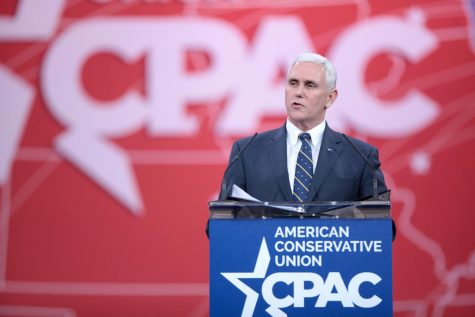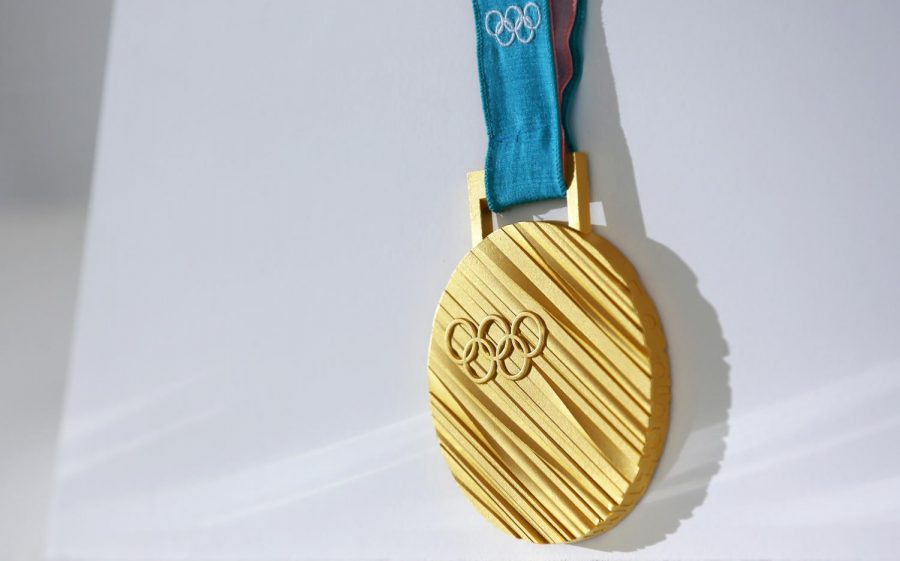2018 Olympics-global athletic pride and political undertones
Courtesy of Republic of Korea/Flickr
A gold medal from the PyeongChang 2018 Olympic Winter Games
March 1, 2018
Two weeks ago at the PeyongChang 2018 Olympics’ opening, Korean diplomacy captured the show.
At the opening ceremony, beneath a single flag, North Korean and South Korean athletes walked together. Reunification songs were sung. South Korean President Moon Jae In received an invitation from Kim Jong Un for talks in Pyongyang. Signaling a possible change in North and South Korean politics.
Vice President Mike Pence attended the Winter Games. However, according to reports Pence did everything he could to give North Korea the cold shoulder. From leaving a desert invitation early, he remain seated during the Korean athletes entrance, to the claim that North Korea would try to “hijack the message and imagery” of the Olympics. A couple of days earlier Pence promised that the toughest sanctions were yet to come for North Korea, keeping this tough demeanor throughout his time in PeyongChang.
The actions could signal more uncertainty for the U.S. with regard to talking with North Korea.

Vice President Mike Pence
Dr. Mark Klobas is a professor of History of Eastern Civilization on the Scottsdale Community College campus. When asked whether the Trump administration’s demands for a complete dismantling of North Korea’s nuclear and missile programs were a reasonable condition for talks or not, Klobas offered some insight.
“I don’t see that as a productive strategy,” Klobas said. “The lesson a lot of leaders have learned in recent years is that, if you don’t have weapons of mass destruction you risk being threatened, bullied, and even attacked by a larger power. Whereas to possess them, is to give yourself leverage.”
Klobas explains the difference between having the kinds of weapons that cause massive destruction and not having them while citing what happened in Iraq.
“[Y]ou had a U.N. inspection regime in place searching for weapons, [they] confirmed that there were none, and there were none found after the United States invaded,” Klobas said. “Whereas to declare that you have nuclear weapons, as Pakistan has and as North Korea has, in effect means they are treated far more gingerly, and far more carefully.”
The U.S. and North Korea tensions are clear. The U.S. wants North Korea to dismantle their weapons, no negotiations have been held at the time. Leaving it as a stalemate for the time being.
The 2018 Olympic Winter Games however showed a rhetoric that left an impression on the many watching this world stage event.
International student, Muhammed Javed from Pakistan, is involved with journalism at Scottsdale Community College and was one spectator who kept a close watch on the Olympics and the underlying political ramifications.
“North Korea is trying to talk now,” Javed said. “After years of, you know, it has gone crazy. But now, it is getting sensitive. It is trying to talk. It is trying to be part of the world. Then why are you denying this opportunity? You should grab this opportunity with both hands and try to capitalize on this opportunity. I think the South Korean president should go to North Korea. He has been invited. And I don’t think he will go, because of U.S. pressure. The U.S. will not let him do that,” Javed said.
Javed discussed some reasonable concessions the U.S. could make to reduce tensions and facilitate talks.
“The U.S. can start by stopping the joint exercises it’s doing with South Korea,” Javed said. “They are doing these ‘strategic exercises’. They can fire nukes to North Korea. So I think the U.S. should stop those things, in order to just start the talks. And if direct talks don’t go well, then you can continue what you are doing. But you can at least try. There is no harm in trying.”
Criminal justice major student at Scottsdale Community College, Lauren Harper, was asked if she thought that U.S. officials were attempting to derail negotiations amongst the Koreans.
“I believe that the U.S. should have no business in facilitating peace talks in the Koreas or anywhere in the world, for that matter,” Harper said. “They are not the only country in the world and they are not the ‘policeman’ for others,” Harper said.
As Pence stated prior to the Olympics, President Donald Trump announced a new round of North Korean sanctions, calling them the “heaviest sanctions ever imposed.” Even though these sanctions are meant to isolate North Korea, South Korean President Moon Jae-in says the North is willing to talk to the U.S. despite these sanctions.
Historically the Olympics have displayed political messages while providing a time for the world to witness a global event and a platform for world pride of athletic competition but the stark tensions surrounding North Korea and the U.S. were exposed as well.


